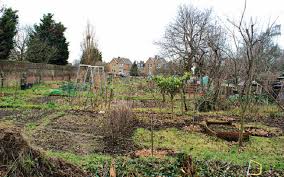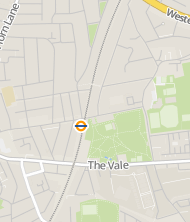Battle To Save Local Allotments
Private land at Goldsmiths Close bought by developer
An historic piece of land, originally bequeathed by John Perryn for the 'good of the people of Acton' in 1675 is under threat.
The land was sold to a local developer two years ago now 12 allotment holders who had plots behind the Grade 2 listed Almshouses on East Churchfield Road have finally been given their marching orders.
There are fears over future plans for the site but writer, broadcaster and local resident, Toby Young says the fight is not over yet.
Below he writes about the plot to save the Goldsmiths Close Allotments :
Since turning 50 I have become a gardening enthusiast. It started with tomatoes, then spread to raspberries and last year extended to French beans. I’ve now run out of space and was hoping to get an allotment in 2016. They’re like gold dust in west London, but one of the perks of living on my street is that the residents’ association has access to the Goldsmiths Close Allotments, a two-acre plot abutting the backs of our houses. I put my name down when I first moved in and was optimistic one might become available this year.
Imagine my dismay, then, when the chair of the residents’ association told me the allotments had been sold to someone called David Parry — a local property developer — and the users had been given their marching orders. Initially, they were told to be gone in June, but the local rep pointed out this was in the middle of the growing season and got a stay of execution until October. Now they’ve been evicted and the new owner has put a padlock and chain on the only entrance, at the rear of a nearby housing estate.
When I first heard about this, I was aghast. Don’t allotment-holders have any rights? ‘Not if the land is privately owned,’ explains Michael Wale, the secretary of the Acton Gardening Association, which oversees all the allotments in these parts. ‘You only have rights if the land is owned by the council. Having said that, there was one middle-class allotment-holder who could have put up more of a fight, but the middle classes never do, do they? The only people that fight are the upper class and the working class.’
In fact, one of my middle-class neighbours is fighting back. He owns a small strip of land behind his house that he bought for his children to grow vegetables on and it connects the main road to the allotments. Even though there’s no access to them at the end of this driveway — they’re walled off — David Parry claims he has a right of way and is threatening to take my neighbour to court. The worry is that if he wins this battle he will knock down the wall and apply for planning permission to erect some monstrous carbuncle. So not only do I have to kiss goodbye to my smallholding dream, I could be facing the prospect of a 15-storey Holiday Inn overlooking my garden.
Actually, to be fair to Mr Parry, he’d be unlikely to get planning permission for that. He’s told my neighbour he wants to open a ‘nursery’, which sounds relatively benign, but few of the local residents believe that’s the limit of his ambition. Rather, their fear is that he will initially apply for consent for a garden centre, then, when that’s granted, seek permission to build something more valuable, like some houses or a block of flats. So proving he has a right of way along the small strip of land behind my neighbour’s house would be the thin end of the wedge.
Some people reading this will dismiss my concern as nimbyism and point out that London is in the midst of a housing crisis. But there’s a bigger issue here, which is whether it’s in the city’s long-term interest to sacrifice community assets like parks and allotments to build more homes. The holders of the Goldsmiths Close Allotments were, for the most part, ordinary working people, not privileged folk like me. ‘People who have allotments usually live in flats and don’t have gardens,’ says Michael Wale.
‘I was devastated,’ says Julia O’Conor, one of the people who lost her allotment in October. ‘It was a wonderful place, a great community of people from all walks of life. It was the social hub of the local area. The older people, in particular, really, really appreciated it. Having an allotment kept them alive.’
My neighbour is unlikely to give up, even if he loses the court case. He believes the old wall that Mr Parry would have to knock down to create access is listed — or should be. And the residents’ association is intending to apply for the allotments to become protected community land. Ultimately, our greatest hope probably rests on Zac Goldsmith winning in May. If David Parry is granted planning permission to develop the allotments and our objections are ignored by Ealing council, we can appeal to the London mayor. An environmentalist like Zac would undoubtedly be more sympathetic than a hard-left Corbyn-ista like Sadiq Khan.
Toby Young is Associate Editor of The Spectator
(Reproduced with permission)
6th January 2015
Related links
|

